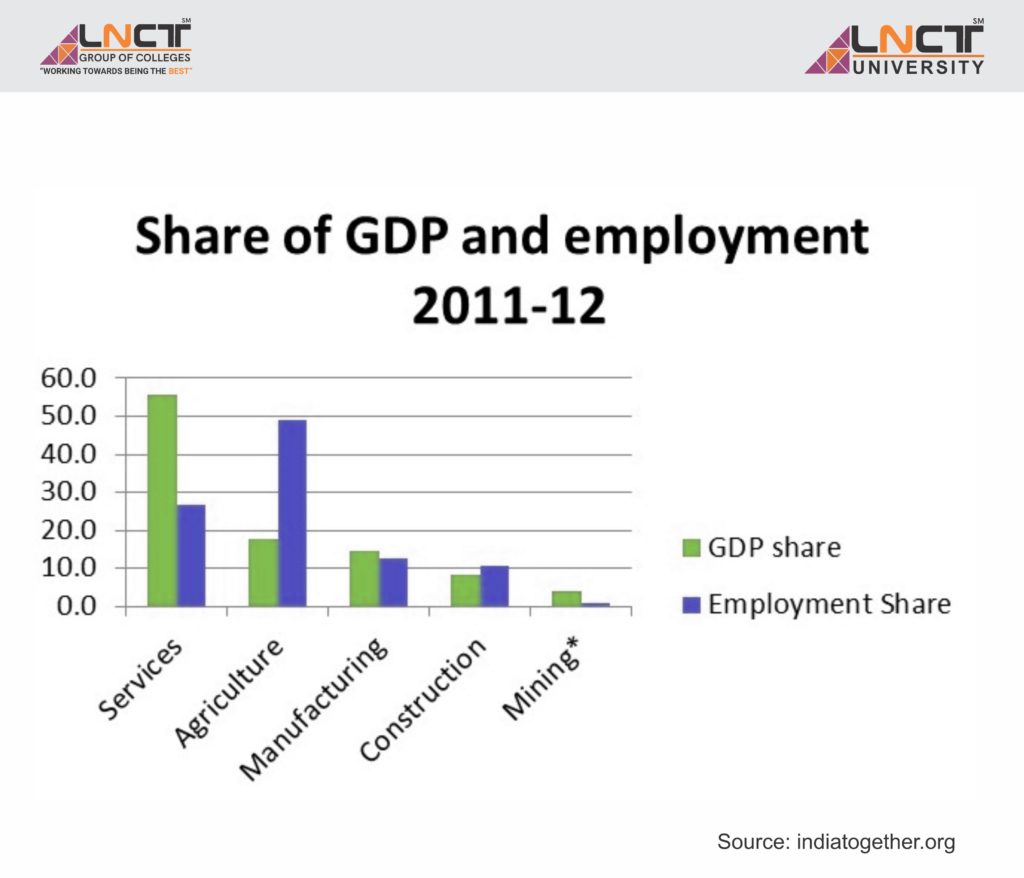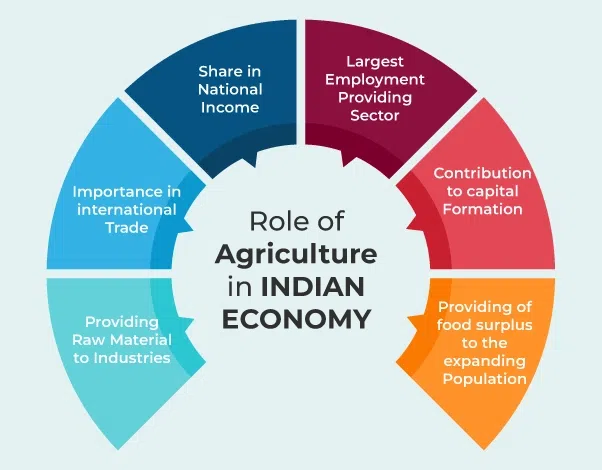Ensuring food security is a key challenge with rising populations around the world. Pursuing agriculture courses provides students with knowledge and skills for the design of sustainable farming practices, increasing crop yields, and optimizing food production systems. The world needs people with smart brains who can bring revolutions in agriculture and ensure food security.
Research and innovation can be used by students to improve farming techniques, develop drought-resistant crops, implement effective watering systems as well as tackle food distribution and storage problems.
The need for fresh and skilled talent and students choosing agriculture courses after the 12th is needed to develop technologies in transforming agriculture, increasing its efficiency, sustainability, and productivity. Agriculture-related degrees expose students to cutting-edge technologies such as precision farming, remote sensing, GIS (Geographic Information System), data analytics, biotechnology, and agricultural robotics. Students will use these tools to optimize the production of crops, manage available resources effectively and deal with problems such as pest control or soil health.
The agricultural sector offers a wide range of entrepreneurial opportunities for those interested in starting their businesses. Agricultural graduates with a degree in agriculture can set up and operate their businesses themselves: Organically produced farms, specialized crop production enterprises, farming technology startups, agritourism ventures, and value-added food processing units.
The right choice in agriculture courses
Bachelor of Science in Agriculture (B.Sc. Agriculture): B.Sc. Agriculture is a four-year degree course focused on the study of agricultural sciences. It covers various agricultural aspects, including the production of crops, soil science, plant pathology, horticulture, animal husbandry, agriculture economics, and more. A strong foundation in agricultural principles, practices, and technology shall be provided to students through this program.
Practical training and field trips are typically part of the agricultural programs to provide hands-on experience. Students may engage in crop production, horticulture practices, soil analysis, animal husbandry, farm management, and agricultural research projects.
The curriculum of B.Sc. Agriculture is designed to provide expertise in various disciplines of agriculture through theoretical knowledge and practical skills. The program typically includes subjects such as:
Agronomy: Study of agricultural production, irrigation and farming practices, and soil management. Soil management also helps to deal with the devastating problem of soil erosion and helps on finding ways to avoid it.
Horticulture: Study of fruits, vegetables, flowers, medicinal plants, and landscaping.
Plant Pathology: Study of plant diseases and their management.
Entomology: Study of insects and their impact on crops.
Soil Science: Study soil fertility, chemistry, and conservation.
Agricultural Economics: Study of farm management, agricultural marketing, and agricultural policy.
Animal Science: Study of livestock management, breeding, nutrition, and health.
Agricultural Engineering: Study of farm machinery, irrigation systems, post-harvest technology, etc.

Who is eligible to pursue a B.Sc. in agriculture?
In general, eligibility criteria for a B.Sc. in agriculture is that candidates must have completed 10+2 or equivalent examinations /diplomas from a recognized board of physics, chemistry, biology, or mathematics as a compulsory subject. The results of entry tests may be taken into account by some universities when they decide to admit students.
What are the career opportunities in B.Sc. in agriculture?
- Agricultural Research: Working as research assistants or technicians at research institutions, agricultural laboratories, and universities.
- Agribusiness: The graduates can also work in fields such as marketing and selling, management of the farm, agricultural financial and banking, farming supply chain management, agriculture consulting, or product development.
- Farm Management: They can manage their farms or work as the manager of large-scale agricultural operations. Farm managers shall be responsible for managing day-to-day operations, crop production, livestock management, budget planning, and sales.
- Agricultural Extension Services: They are promoting the implementation of modern agricultural practices and sustainable farming methods and adopting new technologies by providing technical assistance, training, and education to farmers.
- Agricultural Engineering: They may be working on the design and development of machinery and equipment for farming operations, including irrigation systems, processing plants after harvesting, or farm infrastructure.
- Food Processing and Technology: Graduates can work in the food processing industry to guarantee quality assurance, safety, and development of innovative products.
- Agricultural Sales and Marketing: Trainees may take up employment in the field of agriculture sales and marketing, acting as agents for farming inputs producers, agrochemical firms, seed companies, or farmers’ machinery manufacturers.
- Agricultural Journalism and Communications: Graduates can work as agricultural journalists, science journalists, or communications specialists in agricultural organizations or in the media.
- Organizations involved in environmental protection and nature conservation: You can get involved in projects related to sustainable agriculture, protection of natural resources, protection of biodiversity, and adaptation to climate change in agriculture.
Studying agriculture involves the following subjects.
- Engineering Physics
- Engineering Mathematics
- Engineering Chemistry
- Engineering Mechanics
- Crop Production Technology
- Tractor System and Control
- Irrigation and Drainage System
- Farm Machinery and Equipment
- Dairy and Food Engineering
- Watershed Hydrology
- Environmental Studies
- Environmental Engineering
LNCT has more than one teacher for almost every subject to provide flexibility to the students. Sometimes a topic that teacher “A” cannot explain to students properly, teacher “B” does.
What are the Eligibility criteria for studying agriculture?
The candidate has been required to study the science stream during his 10+2 education in physics, chemistry, mathematics, biology, and agriculture. Candidates usually need to obtain a minimum aggregate percentage of the 10+2 level, which may differ from institution to institution. They range from 50% to 60%, in general.
Career opportunities or job profiles after studying Agriculture
- Agricultural Engineer: Designing and developing farm equipment, irrigation systems, and machinery to improve agricultural processes.
- Agricultural Officer: Working in government departments or organizations to promote agricultural practices, provide technical assistance to farmers, and implement agricultural policies.
- Farm Manager: Overseeing and managing farm operations, including crop cultivation, livestock management, and overall farm productivity.
- Agricultural Research Scientist: Conducting research and development activities to improve crop yield, develop new agricultural techniques, and address challenges in the agricultural sector.
- Food Processing Technologist: Developing and implementing food processing techniques to improve food quality, safety, and preservation.
- Soil Scientist: Studying soil composition and fertility, conducting soil tests, and providing recommendations for optimal crop growth and nutrient management.
- Agribusiness Manager: Managing business operations in agricultural enterprises, including marketing, sales, supply chain management, and financial planning.
- Agricultural Consultant: Provides advisory & consultation services to farmers, agricultural organizations, and government agencies on various aspects of agriculture, including crop selection, pest control, and resource management.
- Plant Breeder/Geneticist: Conducting research and breeding programs to develop new crop varieties with improved traits like disease resistance and higher yield.
- Agricultural Economist: Analysing economic factors affecting the agricultural sector, including market trends, pricing, and policy implications, and providing recommendations for sustainable agricultural practices.
Some other career options in agriculture
Bachelor’s degree in dairy technology: This program is intended for those who wish to study milk science, processing, and product technologies. It covers milk production and processing, quality control, dairy microbiology, dairy chemistry, and plant management. The graduates will be capable of working in the milk sector, dairy cooperatives and establishing their business interests related to milk production.
Bachelor’s degree in forestry: This course involves an in-depth understanding of forests. It teaches how to study, manage and conserve forests and their resources. It covers ecological forestry, silviculture, management of forests, forest economics, wildlife conservation, and environmental sciences. The graduates can work as forest officials, forestry managers, or conservation biologists in research and academia.
Fisheries Science: This course offers to cover the study of fish, their biology, aquaculture, fisheries management, and related areas. It deals with the subjects: Fish Biology, Fish Nutrition, Fish Breeding & Genetics, Fish Health Management, and Fisheries Economics. The graduates can work in fisheries offices, aquaculture facilities, fish processing companies, and research institutes.
Overall, working in the agricultural sector can be rewarding and interesting. Study at LNCT and make your dream come true. With the right guidance at the right place and getting proper resources at the right time is what LNCT is all about. These courses provide the students with the knowledge and skills needed to address global food security challenges, develop sustainable agricultural practices, and contribute to industry development.
If you’re still perplexed about why you are taking up an Agricultural course, let me answer that for you in detail.
Agriculture offers a great future, an untapped market waiting for educated and professional individuals to come and use it for self-growth and the nation. Individuals can significantly impact fields such as agriculture research, farm management, agribusiness, engineering, and various related areas through the broad range of available career opportunities.
There are a lot of opportunities available; every detail has been mentioned about the courses. The path has been provided to you with directions. Agricultural courses play a crucial role in the economy of a country like India.
Reasons why agricultural courses are important in the Indian economy:
- Food Security: India is a populous country with a high demand for food. Agricultural courses provide education and training in modern farming techniques, crop production, and livestock management. By equipping individuals with the knowledge and skills to optimize agricultural productivity, these courses contribute to ensuring food security for the growing population.
- Rural Development: Agriculture is the primary source of livelihood for a significant portion of India’s population, especially in rural areas. Agricultural courses empower individuals with the necessary skills to enhance agricultural practices, increase yields, and improve farm management. This, in turn, leads to improved incomes and livelihoods for farmers, contributing to rural development and poverty alleviation.
- Employment Opportunities: The agricultural sector in India offers a wide range of employment opportunities. These courses prepare students for diverse roles, including farmers, agricultural scientists, agricultural extension officers, agricultural consultants, and agribusiness professionals.
- Export Potential: India has significant export potential in agricultural products. Agricultural courses equip individuals with knowledge of quality standards, post-harvest management, and export procedures. By developing skilled professionals in the agricultural sector, these courses contribute to enhancing the quality and competitiveness of Indian agricultural products in the global market.
- Technology Adoption: The agricultural sector is witnessing rapid advancements in technology and innovation. Agricultural courses expose students to the latest agricultural technologies, precision farming techniques, farm mechanization, and the use of modern tools and equipment. This knowledge enables them to adopt and implement technological advancements in agriculture, leading to increased efficiency, productivity, and sustainability.
- Sustainable Agriculture: With increasing concerns about environmental sustainability and climate change, there is a growing need for sustainable agricultural practices. Agricultural courses focus on sustainable farming methods, organic farming, conservation agriculture, and resource management. By promoting sustainable agriculture, these courses contribute to reducing the environmental impact of agricultural activities and ensuring long-term agricultural productivity.
- Research and Development: Agricultural courses also play a vital role in agricultural research and development. They encourage students to pursue research in various areas such as crop improvement, soil science, pest and disease management, and agricultural economics. Research findings contribute to developing innovative solutions, improving agricultural practices, and addressing challenges faced by the agricultural sector.

Thus, agricultural courses are essential in an economy like India as these courses help create a skilled workforce that can drive agricultural growth, enhance productivity, and address the evolving challenges in the agricultural sector.


